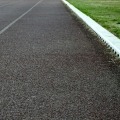Retaining walls are a vital part of many residential landscapes, providing not only visual appeal but essential structural support. Whether they're holding back soil on a sloped yard, framing a garden bed, or acting as decorative dividers, these walls are exposed to the elements 24/7. Yet despite their durability, they often fall victim to premature aging, staining, and even structural weakening—all because of one overlooked factor: buildup from dirt, algae, mold, and moisture. Integrating routine soft washing into your home cleanup or renovation plan is one of the most effective ways to extend the life and beauty of retaining walls.
The Silent Damage Caused by Organic Buildup
Many homeowners assume concrete, brick, or stone retaining walls are maintenance-free, but these materials are surprisingly susceptible to hidden threats. Moisture-loving organisms like moss, algae, mildew, and lichen thrive on shaded or damp surfaces, particularly after rainy seasons. Once they settle in, they begin to trap water and erode the wall’s surface over time. This not only leads to discoloration and staining but can cause freeze-thaw damage in cooler climates or weaken mortar joints in stacked block designs. Even in warmer regions, the slow accumulation of organic growth can degrade the surface finish and promote cracking.
Routine home cleanups might include landscaping or repainting, but neglecting your retaining walls can offset those efforts. An unclean wall not only diminishes your home’s appearance but can also impact the stability of nearby hardscapes and soil. What looks like a surface-level stain may actually be a sign of deeper water intrusion or biological decay that could have been avoided with proper maintenance.
Why Soft Washing is the Right Approach
Soft washing is a cleaning technique that uses low-pressure water and eco-friendly detergents to safely remove contaminants from delicate surfaces. Unlike high-pressure washing, which can gouge stone, loosen mortar, or splash debris into nearby landscaping, soft washing is gentle and precise. It's ideal for retaining walls made of natural stone, pavers, concrete blocks, or stucco—materials commonly found in residential settings.
For homeowners updating their outdoor spaces during a renovation, soft washing provides a critical prep step before resealing pavers or repainting wall caps. It ensures surfaces are clean, free from mold spores, and ready for finishing. Regular soft washing can also prevent the growth of slippery biofilms, which pose a safety risk around high-traffic walkways and garden paths.
In fact, many homeowners schedule wall and siding soft washing together as part of annual home maintenance. Professionals who offer Longwood exterior house washing services often bundle retaining wall cleaning with roof, siding, and driveway treatments, providing a comprehensive approach to exterior upkeep that prevents costly repairs down the road.
Long-Term Benefits That Add Up
When retaining walls are kept clean, they perform better and last longer. Soft washing removes the factors that lead to moisture retention and erosion, two of the main causes of premature failure. With routine attention, homeowners can avoid expensive repairs, structural rebuilds, or complete wall replacements. Plus, clean walls naturally complement nearby landscaping, driveways, and patios—enhancing the overall value and appearance of the property.
Final Thoughts
Retaining walls may be built to last, but they’re not invincible. Routine soft washing is a simple yet powerful step in protecting these structures from hidden damage and visual decay. As part of any home cleanup or exterior renovation strategy, soft washing ensures your retaining walls remain as strong and attractive as the day they were built.







